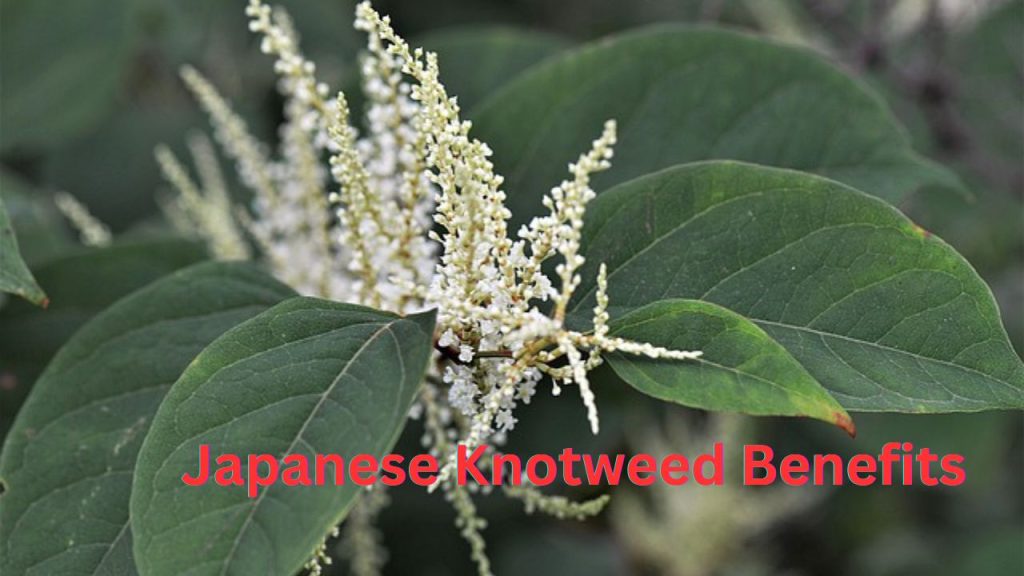Discover the incredible Japanese knotweed benefits, from health advantages like rich resveratrol content to environmental uses such as soil remediation and erosion control. Learn more!
Japanese Knotweed Benefits:
This notorious Japanese knotweed is indeed an invasive plant that aggressively grows and is rather intractable to control. The tenacious plant, though annoying, is not solely an annoyance. To people’s surprise, Japanese knotweed can be used for quite several purposes, especially regarding health and wellness and environment use. This article covers several possible applications of Japanese knotweed along with its benefits beyond invasive potential.
What Is Japanese Knotweed?

Japanese knotweed is a perennial plant belonging to East Asia, originally Japan, China, and Korea. It was in the 19th century taken into Europe and North America as an ornamental, for control of erosion; the stems are bamboo like, and the leaves are broad and green; the small flowers come in clusters of white on stalks that bloom later in summer.
Although Japanese knotweed benefits, it is often regarded as a problem because of its fast growth and outcompeting native vegetation. However, when harvested and used responsibly, this plant has remarkable benefits, especially in herbal medicine and environmental management.
The Japanese knotweed benefits have been linked to the rich bioactive compounds. Some key nutrients and compounds found in Japanese knotweed are as follows:
1. Resveratrol: An important antioxidant that guards against inflammation and has cardiovascular benefits.
2. Emodin: A compound naturally occurring that has antimicrobial and laxative properties.
3. Polydatin: It is a precursor to the typical action of resveratrol.
4. Vitamin A and C: They help for immunity and healthy skin.
5. Mineral Content: This herb carries essential mineral salts, like zinc manganese and potassium.
Health Uses of Japanese Knotweed
1. One of the Major Reservatrol Source
One of the most abundant natural sources of resveratrol, a substance present in red wine and grapes, is Japanese knotweed. The well-known antioxidant properties of resveratrol shield cells from oxidative damage.
2. Supports Immune Health
The presence of Vitamin A and C make the juice of the above plant important in boosting the immune system. These vitamins when taken together help the body to guard against infections, support the production of new white blood cells and speed up the rate of healing when one is sick.
3. Anti-Inflammatory Properties
The root of chronic diseases incuding arthritis, heart disease, as well as autoimmune diseases more often than not lies in inflammation. The resveratrol content in Japanese knotweed has been proven to exert potent anti-inflammatory effects and will thus be useful for diseases such as:
Rheumatoid arthritis Chronic pain Skin disorders such as eczema
4. It Helps in Digestive Health
Emotionally, emodin in Japanese knotweed acts as a natural laxative agent that reduces constipation or supports normal bowel movements; besides that, its microbial action could reduce harmful bacteria associated with poor gut health.
5. Cognitive Benefits
Research is emerging whereby the antioxidants in Japanese knotweed like resveratrol work as neuroprotective agents.
– These compounds may potentially improve memory and cognitive function.
– Preserve the brain against age-related degeneration, like Alzheimer’s disease.
– Reduce oxidative stress in the nervous system.
6. Skin Health

Japanese knotweed’s vitamins and antioxidants support healthier skin through enhanced production of collagen and decreased visibility of wrinkles. It has anti-inflammatory effects, thus controlling acne and other dermatological disorders.
7. Antimicrobial and Antiviral Properties
The plant contains compounds known to fight bacterial and viral infections. Traditional medicine has, for a long period used Japanese knotweed extract treatments for infections and aiding their immune system.
Environmental Benefits of Japanese Knotweed
1. Soil Remediation
Japanese knotweed has been used to rehabilitate contaminated soil. Its roots can absorb heavy metals and pollutants, making it useful for cleaning up areas affected by industrial waste.
2. Erosion Control
However, its aggressive characteristic and fast-growing root system make it capable of acting as a good distributor of wild life and control of land erosion in flooded or landslip prone areas.
3. Wildlife Habitat
While it’s often considered harmful to native vegetation, Japanese knotweed can provide temporary shelter and food for certain wildlife species, such as insects and birds.
How to Use Japanese Knotweed Safely

If you’re interested in reaping the Japanese knotweed benefits, it’s important to use it responsibly. Here are some common ways to incorporate it into your routine:
1. Supplements
Japanese knotweed can be consumed as a dietary supplement. It is available in capsules and in powder form. The capsules or powder supplements are generally standardized for resveratrol content. Use only reliable brands to ensure that your supplement is of the right quality and safe to consume.
2. Herbal Teas
Dried Japanese knotweed can be prepared as a herbal tea. This provides natural antioxidants and vitamins.
3. Topical Applications
Extracts of Japanese knotweed are sometimes included in skincare products to keep skin healthy and glowing.
4. Culinary Uses
Young shoots of Japanese knotweed are sometimes harvested for cooking. The shoots are tart, like rhubarb, and can be added to soups, stews, or desserts.
Precautions and Possible Side Effects
While Japanese knotweed has many advantages, it should be approached with caution in the following respects:
– Invasive property:
Some parts of the Japanese knotweed can also be inadvertently spread after the plant has been harvested. Always use the plant in manners responding to the regulations of the local handling and disposal.
– Laxative:
Intake of large doses of this supplement will cause diarrhea and upset stomach.
– Allergy:
The Japanese knotweed may be an allergen to some individuals. Use a small amount first to be able to determine how sensitive the sample is.
– Drug Interactions:
An interaction may exist between Resveratrol for any blood thinning medicine and other prescribed medicines. One should consult a doctor before taking Japanese knotweed products.
Japanese Knotweed in Traditional Medicine

In traditional Chinese and Japanese medicine, Japanese knotweed has been used for centuries to treat various ailments, including:
– Respiratory issues like coughs and bronchitis.
– Skin conditions such as rashes and burns.
– Digestive disorders, and constipation.
Traditional medicinal uses reflect the usefulness of this plant as an invader beyond just invasive potential. Read about is soy sauce good for weight loss!
Conclusion:
Japanese knotweed is one of those plants that is often labeled as an invasive species; however, it has its own wealth of benefits, which deserve attention. Whether it is its rich content of resveratrol or its potential for remediation of soil, the plant has much to give. When used responsibly, Japanese knotweed benefits can give way to better health, environmental management, and even culinary exploration.
If you are considering including Japanese knotweed in your diet or wellness program, you need to talk to a health professional so that you will be assured of safe and effective usage. With this, we are able to shift the stigma surrounding Japanese knotweed as a problematic weed into becoming a valuable resource.




